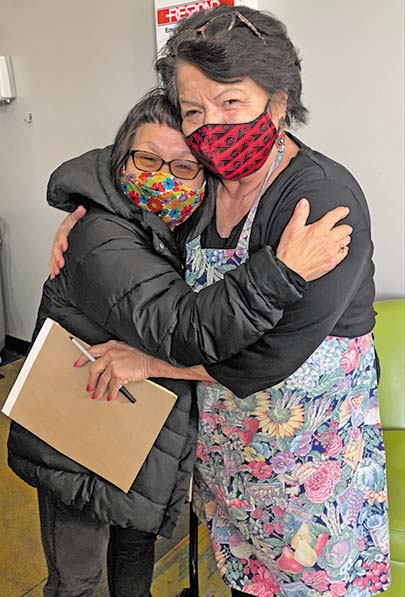
Category: Tulalip News
25th Anniversary (plus one) of the Evergreen State longhouse
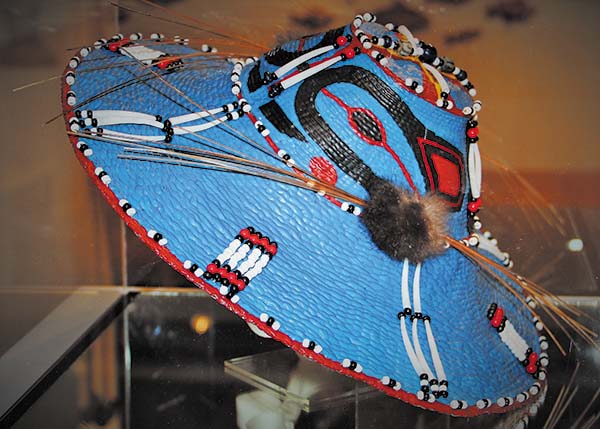
Spruce root, sea otter fur, dentalium, antique Russian trade beads, imitation sea lion whiskers,
suet, cloth straps
“AWIRNAQ represents my hunt for my roots, which started as a student of Native American Studies in 1994. Through the Longhouse community, I connected with and studied under many Northwest Master Basket Weavers and participated in Pacific Art Northwest 1997 – 1999, winning two awards.
As a member of the Northwest Native Basketweavers Association, I first connected with an Alutiiq grass basket weaver. In early 2010, I traveled to St. Petersburg, Russia with the director of the Alutiiq Museum, plus four other Alutiiq weavers and one Tlingit weaver. We studied collections of hundreds of Alutiiq weavings from the Koniag region, including many spruce root hunting hats. These were highly decorated and some brightly painted to express hunting prowess.
After several years, I was able to collect and process enough spruce root to weave this hat—similar to one that is in the Smithsonian Museum. Fellow Alutiiq artist, Jerry Laktonen, honored me with his painted whale design. This has been a meaningful journey of connection for me and I would be honored to have AWIRNAQ on exhibit where my journey began. I am grateful to our Creator for guiding my hands and heart, and for bringing me to the Longhouse.”
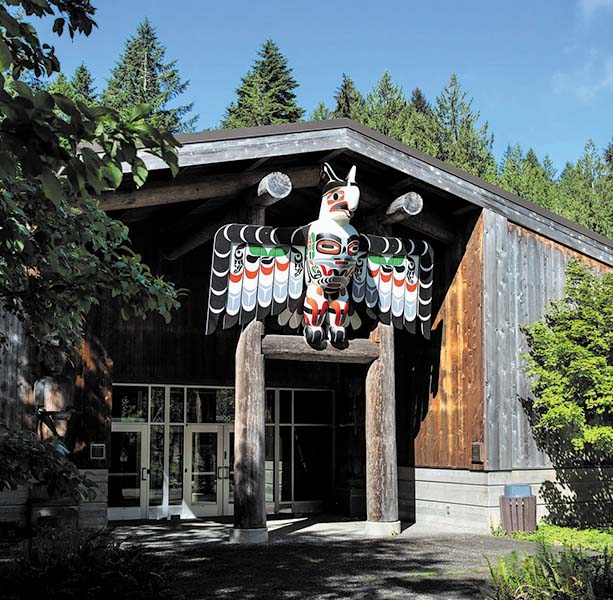
By Micheal Rios, Tulalip News
Native artists are luminaries of their shared cultures, lighting the pathway back into the far reaches of history, and leading the way into the future with their creative vision. In continuing our celebration of November as Native American Heritage Month, we offer our readers a stunning collection of artwork offered by such luminaries. These examples of fine Native craftsmanship were curated by the devoted longhouse team at Evergreen State College.
The “House of Welcome” longhouse education and cultural center is a public service center on the college’s Olympia campus. Built in collaboration with Northwest Tribes, it is the first building of its kind on a public campus in the United States. It was a dream of Native students, tribal artists and faculty member Mary Ellen Hillaire (Lummi Nation), who founded Evergreen’s Native American Studies program in 1972.
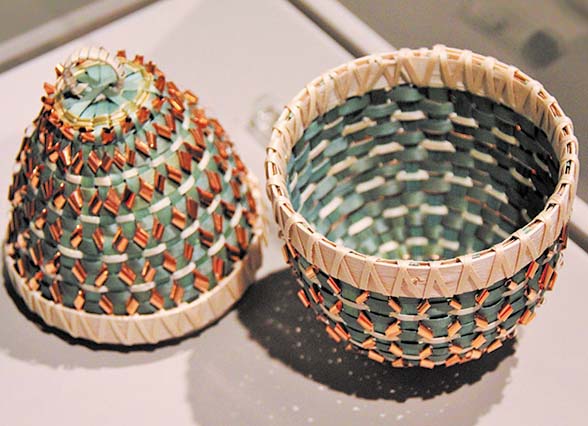
Black ash, black ash seed, Rit Dye, sweet grass, copper, velvet, sinew
“The Emerald Ash Borer was discovered in 2002 in Michigan in the eastern side of the state. At that time thousands of ash trees had died. It is called the Emerald Ash Borer because it is a beautiful emerald green color with a copper colored belly. This basket represents the Emerald Ash Borer, with its green and copper colors, and opens to a vial containing the Emerald Ash Borer and a black ash seed;
The End and the Beginning.
The black ash tree is the last to get its leaves in the summer, and the first to lose the leaves usually.
The seeds take 2 years to germinate. They drop to the ground in the fall time, go through a winter, spring, summer, and the next summer it begins to grow. It grows in the swamps and wetlands and provides food
for our white tail deer.
The tree provides the community with splints for baskets that provide utilitarian baskets such as baby baskets, fishing creels, ceremonial baskets and more, as well as the finances for food, shelter, and future harvests to do it all again. It provides communities with teachings that bring together families, weavers, and future generations to carry these teachings on into the next generation. While it seems like the end is inevitable, I also see this as a new beginning. A new resurgence, an urgency, a recognition, the awakening of blood memory. Our people are strong and with good hearts, they are learning, they are weaving, they are hearing the voices of their ancestors, and they are listening.”
In 1995 their dream came true thanks to the perseverance of Evergreen graduate Colleen Jollie and since that time, the mission of Evergreen’s “House of Welcome,” has been to promote Indigenous arts and cultures from not only the Pacific Northwest, but nationally.
Since opening, the Longhouse has awarded over $800,000 in individual artist grants; it has hosted over 200 artists residencies and workshops; it has premiered 15 art exhibitions; sent six Northwest Native American artists to New Zealand for artist residencies; and hosted two international artists gatherings featuring Indigenous artists from around the Pacific Rim.
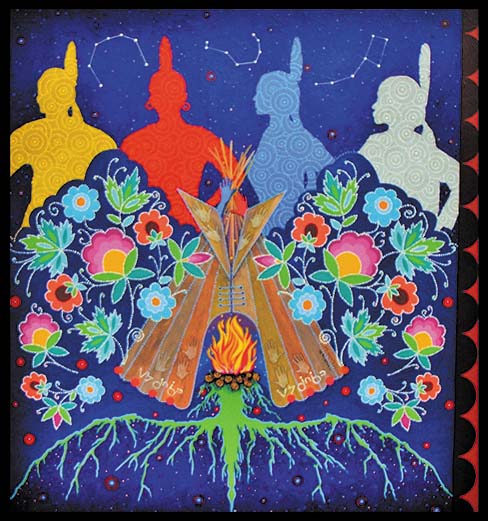
Acrylic on plywood
“This collaborative piece was designed as one of twelve puzzle pieces adorned with traditional stories by both North and South American Indigenous artists. This work discusses many aspects of the interconnectedness of all life. The home fire (society), the stars (sweat lodge elements), tipi poles (each has teachings on how to behave as a thinking human being), rock around the tipi bottom (a woman’s skirt, modesty), the rope binding the tipi poles (We Hold Our Life Together), and the lovely plants that provide medicine and food for all.”
This past summer, Kara Briggs (Sauk-Suiattle) was appointed as Vice President for Tribal Relations, Arts and Cultures. Briggs is determined to continue Evergreen’s 50 years of success as an institution that serves Native students, helping them to which has pave the way to successful careers in their own Tribes, as well as in government, arts and sciences.
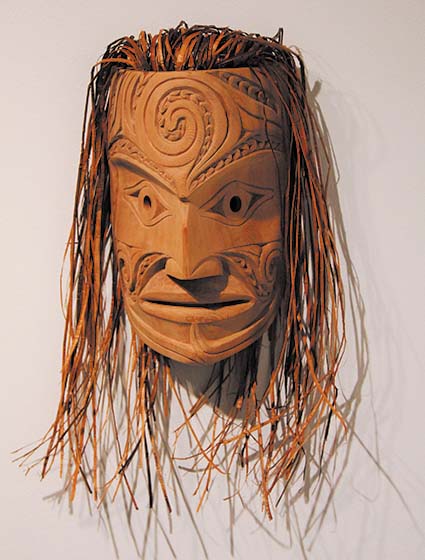
Friendship Mask. Red cedar, red cedar bark
“Along with the print Pacific Connection, this piece is influenced by my collaborative work with master carver Lyonel Grant during the summer of 2015. We had the opportunity to make monumental carvings for the new Evergreen Fiber Arts Studio that truly blends Northwest Native and Māori design
elements and motifs.
`As an artist, I work with both contemporary and traditional mediums, and I am always fascinated with translating three-dimensional carved elements into two-dimensional printed images. I first carved the Friendship Mask out of old-growth red cedar and adorned it with cedar bark for hair. This mask represents the new connections made between Pacific Indigenous nations and peoples.”
“The Evergreen Longhouse is a nationally important center for Northwest Native arts and model for other state and private colleges in how to work with Tribes and Native artists to advance Native cultural and artistic expression,” Briggs said. “As The Evergreen State College looks to the next 50 years, and the Longhouse to the next 25 years, we must continue to grow our relationships with Tribes and Native artists, so that we are always creating pathways for Northwest Native peoples to advance.”
2021 marks the 25th Anniversary (plus one) of Evergreen’s longhouse. The faculty and support staff who embody the heart of the longhouse enjoy convening groups of artists, providing a venue, forum and tools that are needed for artists to express their creativity.
A retrospective art exhibition opening on November 20th, featuring Indigenous artists from throughout the Pacific Rim who have contributed and participated in the work of the longhouse for the past 25 years. The exhibit is free to the general public and can be seen in Evergreen’s gallery located in the Daniel J. Evans building on the college’s Olympia campus. It runs through January 29, 2022.
November 20, 2021 syəcəb
Please use the following link to download the November 20, 2021 issue of the syəcəb
Fish Commission Meetings
Tulalip Tribes Planning Commission Notice of Public Hearing
“This was one of the most successful Bazaars yet!”
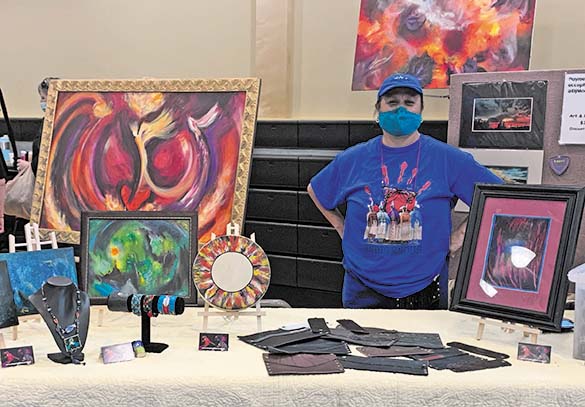
By Shaelyn Hood, Tulalip News
Following last year’s Covid-19 cancellation of the Native Bazaar, many people were eager to see what this year’s Bazaar had to show. Many artists used the event as a time to hone in on their craft and create beautiful pieces for the sale. With over 49 vendors signed up, volunteer organizer, Tammy Taylor, knew this year was going to bring a lot of surprises.
The Bazaar started on Friday November 12 and continued through Sunday November 14. Vendors had a variety of items from, cedar hats/headbands, quilts, acrylic paintings, beaded jewelry, Christmas ornaments, knitted hats, smoked salmon, handmade drums and rattles, and much more. The event drew in such a large crowd that some vendors had sold out by Friday and Saturday. In their attempts to continue selling, vendors went as far as making new pieces overnight to bring the next day.
Monie Ordonia, a painter and vendor at the event, talked about her experience, “Everyone must have really missed this, we’ve had a lot of foot traffic. It makes me happy to get people excited about art; when they get into the wondering ‘awe’ state, where they want to take it home with them. I take that feeling with me.”
As we all know, COVID-19 caused a lot of disruptions for gatherings and the Native Bazaar became one of the first major events where the community could come together again. And for many, that was the most important thing.
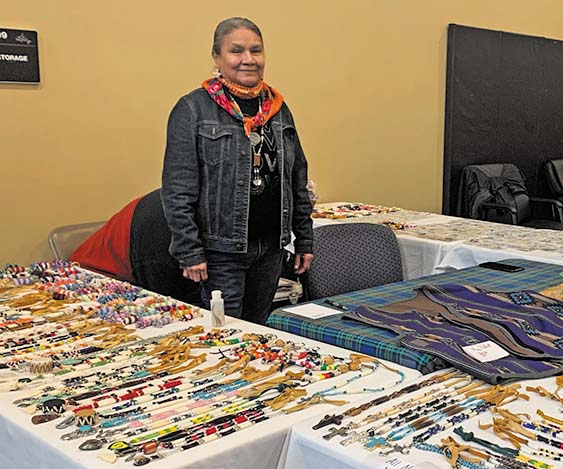
“I usually travel with my family to different elders’ luncheons, it’s nice to be able to come back here and be with the community,” said vendor, Tammy Yelm
For another vendor, Lisa James-Rodriguez, this was her first year at the Native Bazaar, “I’ve been crafting for six years; art has really become my therapy. During quarantine, it helped keep my sanity, I got to explore new crafts and styles, and the art just speaks to me. Art is a feeling.”
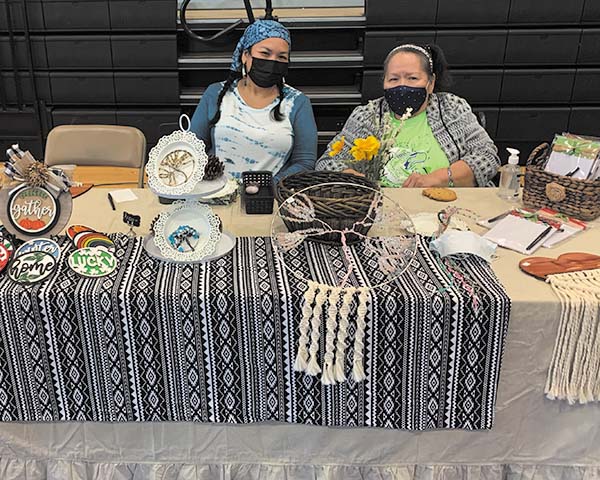
Art can be such a fun and emotional process for a lot of artists, and in many ways, they are exposing themselves. The Tulalip community really came together and showed their support for the event and for these artists. Tammy Taylor was extremely happy, “This was one of the most successful Native Bazaars yet! We were all surprised at the turnout. Thank you to the Tulalip Community for coming out and supporting your local Tulalip artists.”
She also gave a shout out to the maintenance team, “Barry Davis, Don and their group, they helped set up everything in two hours. Every year they are so gracious and help with cleaning up and supporting our events. They help everything run so smoothly.”
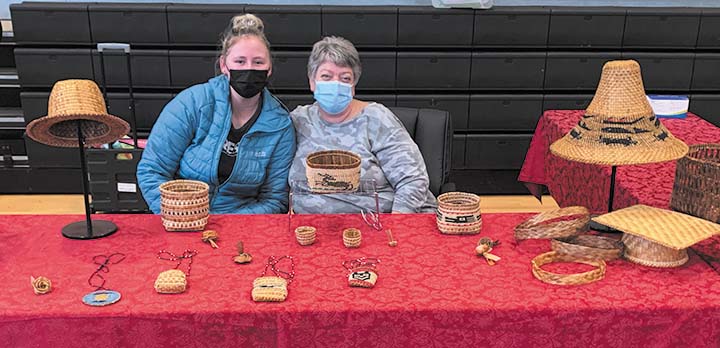
The Native Bazaar will be taking place one last time before the end of the year, December 3-5 from 9:00 a.m. – 4:00 p.m. at the Don Hatch Jr. Youth Center. The same vendors will be attending, but expect new things!
Unfortunately, at this time, the space is filled and cannot take anymore new vendors. If you would like to join the waitlist, or have any questions about the upcoming Bazaar, please contact Tammy Taylor at: 425-501-4141
MSD adopts very first Equity Plan

By Kalvin Valdillez, Tulalip News
“When I was growing up we did not see ourselves in school,” expressed Quil Ceda Tulalip Elementary Vice-Principal and Tulalip tribal member, Chelsea Craig. “We did not see our people, our way of being. We were expected to check who we were at the door of the school and conform to the colonized system that we were forced to participate in. This policy is the beginning stages of changing that practice. It honors the unique and beautiful communities that each of our students come from. It puts the heavy lifting on the adults to change their practice and their thinking to meet the needs of all of our kids. It interrupts the status quo, that has long-standing shown, does not work for our Native students and other students of color.”
For the first time in history, the Marysville School District (MSD) has adopted an equity policy in an effort to ensure that their students, faculty and families feel safe and supported through their academic careers and time spent within the school district. November 3 marked an important and historic day, as the district took the first step in a long journey. A journey worth striving for where kids can thrive in a comfortable learning environment and simply be themselves without worrying about bullying, harassment, or experiencing educational disparities and barriers based on their culture, ethnicity, religion, gender identity, sexual orientation or socioeconomic status.
Said Eneille Nelson, MSD Executive Director of Equity and Family Engagement, “This educational equity policy was created by students, parents, community members and staff. It was very important to have the right people at the table thinking about the needs of our students, families and staff of our district. It will serve as the foundation to initiate the necessary sustainable changes for years to come. The policy is just the beginning of the work we have to do, a foundation for us to build upon.”
Over numerous pages, the policy identifies five key areas that MSD will focus on to implement the Equity Action Plan; Human Resources, Teaching and Learning, Leadership and Partnership, Climate and Culture, and Responsibility/Accountability.
If executed as planned, the district will recruit and hire a more diverse workforce, whom students can identify with, relate to and confide in. Eliminate systemic inequalities in curriculums and educational materials by providing their staff with professional development training and tailoring lessons so their students can see themselves within the curriculum. Build and foster strong relationships with their students, families and local communities, namely the Tulalip Tribes, City of Marysville and Snohomish County, to ensure they have input in major decisions and that their voice is heard and well-represented. Offer a safe and inclusive learning environment where the proper resources are readily available to their students. And hold staff, the school board and the yet-to-be-appointed superintendent accountable by closely monitoring the progress of the policy through annual reports, reviews and surveys – to name a few highlights from the newly established policy.
“The Marysville School District has never had an equity policy before and we have seen the painful effects on our kids and our community,” stated Liz Gobin, MSD teacher and Tulalip tribal spouse and parent. “Having a comprehensive equity policy holds everyone in the district accountable to ensure that our kids feel safe and that the biases that have existed in the larger community and educational systems will no longer be tolerated. There have been many feel-good statements about equity over the years but having a formal policy adopted means that there is finally action happening. Along with this initial policy, the advisory teams are continuing to develop the action steps that go along with it, including things like professional development to educate staff, more diverse hiring practices, evaluating discipline data, and holding every person accountable to interrupt racism and biases as they occur.”
She continued, “This Equity policy was created for and belongs to each of our children. I want to encourage every family to use their voice to make sure we keep building on this policy and that we never go backward. As our school board changes and our superintendent search begins, it’s important to remember that what we demand as parents and as a community makes a difference. We need to pay close attention to what is happening and work together to make sure this policy stays at the forefront of all of the work happening in the district.”
As Liz mentioned, MSD is currently undergoing several changes as the school board welcomes three new directors to the five-seat panel, two of whom have shown opposition to curriculum such as Critical Race Theory and have vocalized they would not support any curriculum that places value on any race, gender or national origin above another. That is why she is urging other parents to get involved as the new policy goes into effect, to ensure that the equity policy is implemented as planned and the needs of MSD students and families hailing from various backgrounds are met. And that their students are also afforded a safe and positive learning environment, as well as celebrated for their differences.
Chelsea shared, “At QCT we have been working for many years to change the mindset of school, grounded in the traditional values of the Tulalip Tribes. We have been working to build our understanding of race and equity and the role each of us play in creating a learning environment that reflects the community we serve, that honors the beauty that each of our children bring into a very colonized space. MSD passing this policy grounds the much-needed work to heal our Tulalip/Marysville community.”
Eneille added, “Our next steps will be to create an action plan that will put actions to the areas addressed in our policy. Everyone in our district and community have a part to play in the success of our policy and action plan. We all have to hold each other accountable and not expect one person or group to do all of the heavy lifting. If we work together, this policy and action plan can bring the change many have been waiting and hoping for.”
To view the MSD Eduction Equity Policy please visit: https://drive.google.com/file/d/1yb3sRKRNQOil-Afud66Qxq9HXqW27zQu/view
The district’s current Equity Action Plan can be found at: https://core-docs.s3.amazonaws.com/documents/asset/uploaded_file/1312201/MSD_Equity_Action_Plan_Web_Version.pdf
For additional information, please contact the Marysville School District at (360) 965-0000.
November 13, 2021 syəcəb
60 years of commitment
Pete and Sherry Guzman share advice for a long and healthy marriage
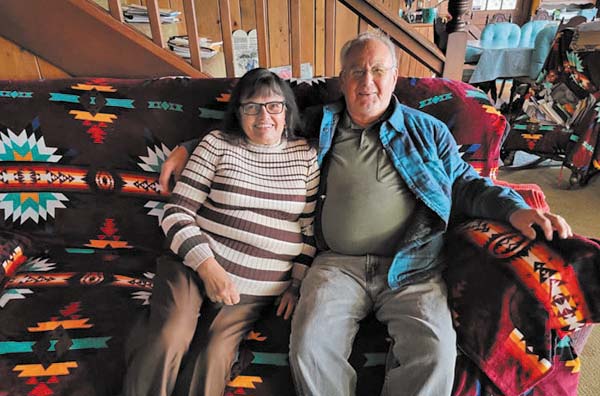
By Niki Cleary, Tulalip News
As they celebrate their 60th anniversary, Pete and Sherry Guzman want to inspire young people to find and keep a love like theirs. Sherry was a teenager and Pete in his early 20’s when they married. Together they’ve raised 7 children, 35 grandchildren and they have 68 grandchildren with more on the way.
When asked to share the secret to their success, Sherry teased, “He picked a good woman.” She followed it by saying she picked an equally good man. As they reminisced about their many years together they emphasized that it’s important to love, respect and care for each other.

Sherry said they’ve always supported one another. Her asthma means vacuuming is difficult for her, but she happily does the bookkeeping for their trucking company.
“I do the vacuuming for her and I don’t mind doing it,” Pete explained. “You have to work together. If either side isn’t, then it won’t work. You have to pay attention to your wife,” Pete continued, “I want young couples to know, and I failed at this while we were young, but if you do this your relationship will be a lot better. Listen, and never go to bed angry. Talk things out.
“Always do something nice for them, “Pete pointed to the many Native American dolls decorating their home, his wife’s prized collection. “You have to have closeness, you have to pay attention to her as much as you can. If you go someplace and she doesn’t go, always bring something home for her. Show that you care and be loving. Whenever I go someplace, I look for these Indian dolls for her.”
Sherry smiled, “He kind of spoiled me.”
Pete reminisced about shopping with Sherry and always checking in about their household. “Another thing we do, we never buy anything without talking it over. We’ve done that since we got married.”
Sherry talked about the importance of their spirituality as well. In addition to their marriage, the two were sealed by the church in 1982, a practice that connects them during life and after.
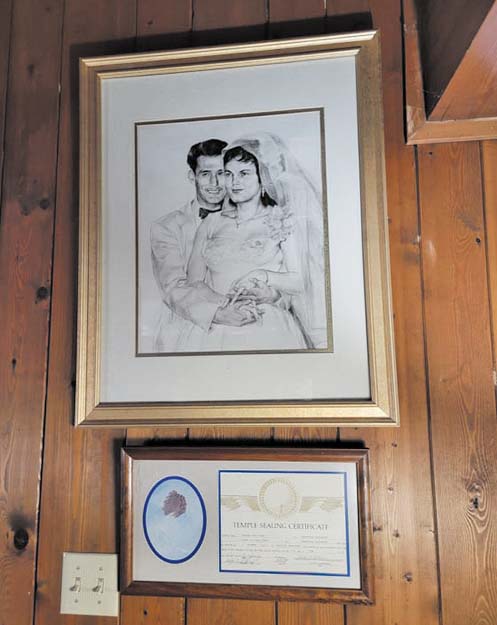
“Lately, we read scriptures together and pray every morning and every night. That helps us,” she said. Family and faith are priorities Sherry explained.
“We’re so proud of our kids and grandkids,” she said. Her advice for others hoping to have as long a marriage, “Put God in your life. I want people to stay committed and keep trying and keep showing each other the love that you feel.”
Auntie Valda’s 1st Annual Winter Clothing Drive
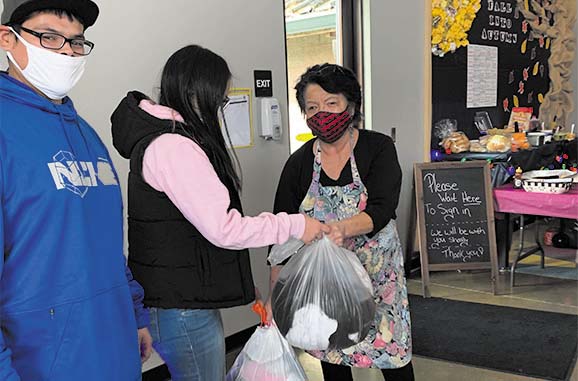
By Shaelyn Hood, Tulalip News
Valda Gobin is a Tulalip Elder who has worked tirelessly to help those less fortunate. For most of her career, she has worked for the Tribe, but what most people know her for are her personal endeavors and efforts to collect clothing, personal items, cleaning products, etc., for people who are struggling within and outside of the Tulalip community.
Even though Valda has been doing this type of work continuously throughout years, this was the first event that she has put on in hopes of preparing warm items for the winter.
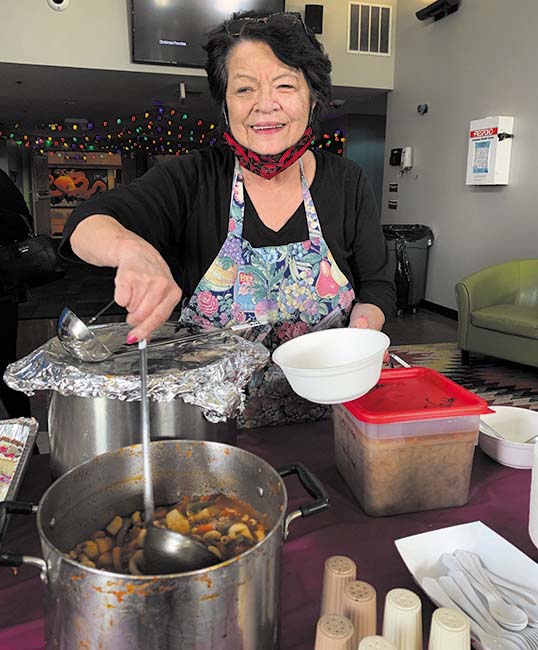
The clothing drive continues through November 10, with donation drop-off locations at the Don Hatch Youth Center, 6700 Totem Rd., and at Homework Support, 7707 36th Ave NW Building F. New or gently used items like jackets, gloves, hats & scarves, boots, handwarmers, ponchos, socks, wipes/toiletries, blankets, and coat hangers are greatly appreciated. Outside of any physical items, monetary donations are also accepted.
With the help of the Tulalip Education Division, Valda is able to cook and serve food to people who come to support and make donations.
Valda’s passion stems from her mother, Winona “Nonie” Mable Parks Cooper. Often, Nonie would tell her kids to collect money, and food to give to those on the street. It was because of her mother, that Valda continues to help others, “It makes me feel good. People make bad choices, but that doesn’t make them bad people. We just help people that need help.”
In her efforts to help people, she also tries to connect people to the recovery programs, and assistance programs that Tulalip offers.
Shana Simpson has recently joined Valda to help collect, wash, and prepare clothing items for donation. They work with the Community Donation Program at the Tulalip Elementary School.
So far, the event has already been so successful in filling the bins at the drop-off sites. However, Valda and Shana will continue to accept donations throughout the year. If you would like to donate, or you are someone who is struggling, please contact Valda at: 4258704214, or Shana at: 3609131199.




